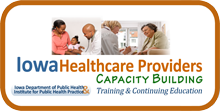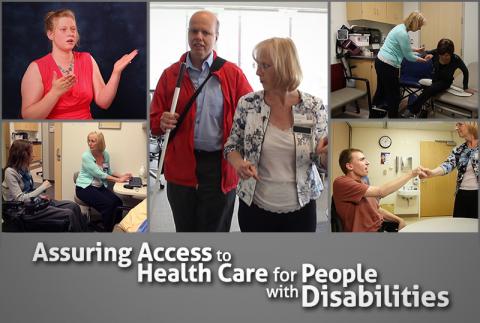Course Summary
There are eight
main topics in this training video :
- Meeting Your Patient
- Providing Equal Access to Quality Care
- Respecting Patient Choices
- Documenting Need for Medical Equipment
- Assisting a Person with Visual Impairment
- Communicating with People Who are Deaf or Hard of Hearing
- Working with Patients Who are Difficult to Understand
- Hidden Disabilities
A Certificate of
Completion is awarded on successful completion of this training. If you have
any questions regarding the contents or materials presented, please
email CDD at cdd@training-source.org
Intended Audience
Health care providers
Learning Objectives
After completing this training video,
participants will be able to:
- Recognize what a disability is.
- Recognize the prevalence of disabilities and health
disparities. - Learn strategies for communicating with people with
disabilities, including active listening and teach-back. - Communicate more effectively with all patients.
Pre-requisites/Learning Level
No Pre-requisites
Competencies addressed
Core Competencies for Public Health
Professionals identified:
Domain 3: Communication Skills
- 3A2. Communicates in writing and orally with linguistic and
cultural proficiency (e.g., using age-appropriate materials, incorporating
images). - 3B2. Communicates in writing and orally with linguistic and
cultural proficiency (e.g., using age-appropriate materials, incorporating
images). - 3C2. Communicates in writing and orally with linguistic and
cultural proficiency (e.g., using age-appropriate materials, incorporating
images). - 3A4. Suggests approaches for disseminating public health
data and information (e.g., social media, newspapers, newsletters, journals,
town hall meetings, libraries, neighborhood gatherings). - 3A6. Communicates information to influence behavior and
improve health (e.g., uses social marketing methods, considers behavioral
theories such as the Health Belief Model or Stages of Change Model). - 3B6. Communicates information to influence behavior and
improve health (e.g., uses social marketing methods, considers behavioral
theories such as the Health Belief Model or Stages of Change Model). - 3C6. Evaluates strategies for communicating information to
influence behavior and improve health (e.g., uses social marketing methods,
considers behavioral theories such as the Health Belief Model or Stages of
Change Model).
Domain 6: Public Health Sciences Skills
- 6A1. Describes the scientific foundation of the field of
public health - 6A2. Identifies prominent events in the history of public
health (e.g., smallpox eradication, development of vaccinations, infectious
disease control, safe drinking water, emphasis on hygiene and hand washing,
access to health care for people with disabilities). - 6B2. Describes prominent events in the history of public
health (e.g., smallpox eradication, development of vaccinations, infectious
disease control, safe drinking water, emphasis on hygiene and hand washing,
access to health care for people with disabilities). - 6B3. Applies public health sciences (e.g., biostatistics,
epidemiology, environmental health sciences, health services administration,
social and behavioral sciences, and public health informatics) in the delivery
of the 10 Essential Public Health Services. - 6C2. Explains lessons to be learned from prominent events
in the history of public health (e.g., smallpox eradication, development of
vaccinations, infectious disease control, safe drinking water, emphasis on
hygiene and hand washing, access to health care for people with disabilities). - 6A7. Describes the laws, regulations, policies, and
procedures for the ethical conduct of research (e.g., patient confidentiality,
protection of human subjects, Americans with Disabilities Act). - 6B8. Identifies the laws, regulations, policies, and
procedures for the ethical conduct of research (e.g., patient confidentiality,
protection of human subjects, Americans with Disabilities Act). - 6C8. Ensures the ethical conduct of research (e.g., patient
confidentiality, protection of human subjects, Americans with Disabilities
Act).
CEUs Offered
None
Cost
Free
Modality/format
Online Self-Pace
Length
1 hour
Presenter(s) and/or Content
Experts
Scott Lindgren, PhD; Ann Riley BSN, MA; Mike Hoeing, MA
Technical requirements
- Adobe Acrobat Reader
- Flash Player
- Speakers
Registration requirements
Register a free account
Creation and/or update
June 18, 2013




